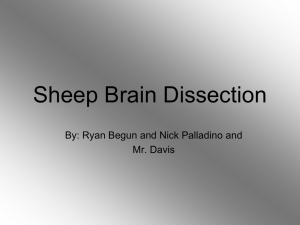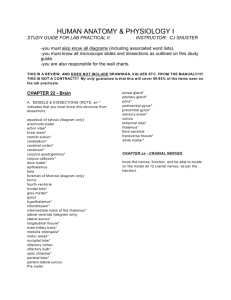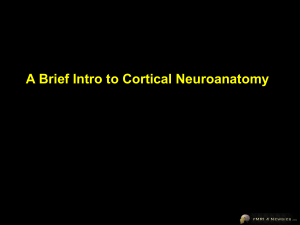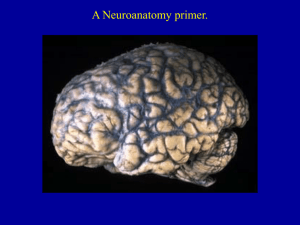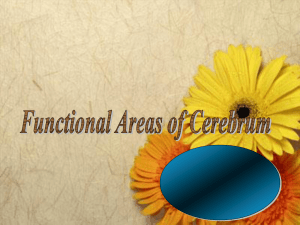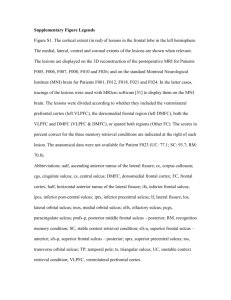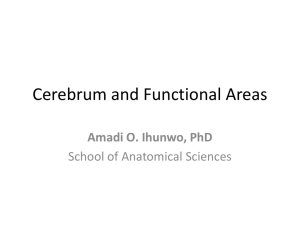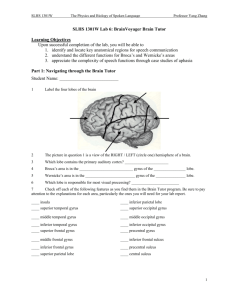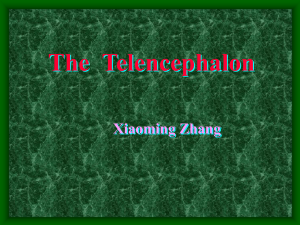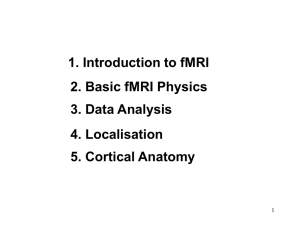Cortical Sulci - Department of Psychology
advertisement
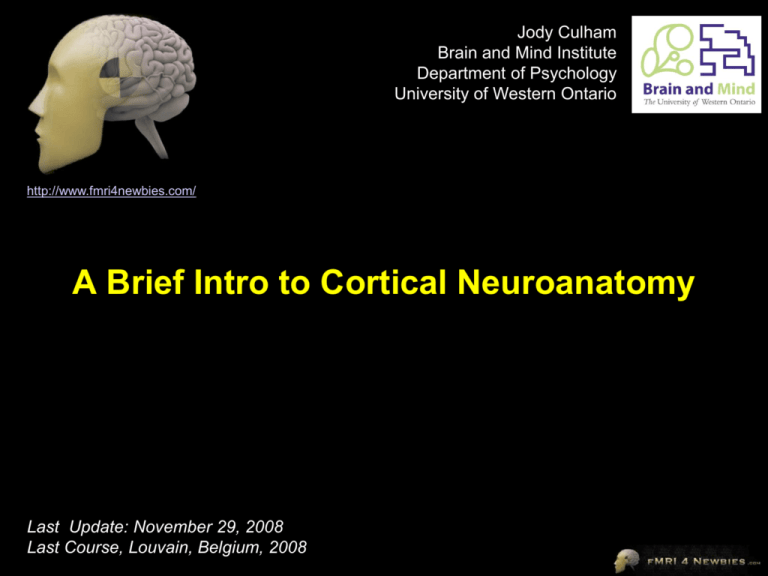
Jody Culham Brain and Mind Institute Department of Psychology University of Western Ontario http://www.fmri4newbies.com/ A Brief Intro to Cortical Neuroanatomy Last Update: November 29, 2008 Last Course, Louvain, Belgium, 2008 14 Major Sulci Main sulci are formed early in development Fissures are really deep sulci Typically continuous sulci •Interhemispheric fissure •Sylvian fissure •Parieto-occipital fissure •Collateral sulcus •Central sulcus •Calcarine Sulcus Typically discontinuous sulci •Superior frontal sulcus •Inferior frontal sulcus •Postcentral sulcus •Intraparietal sulcus •Superior temporal sulcus •Inferior temporal sulcus •Cingulate sulcus •Precentral sulcus Other minor sulci are much less reliable Source: Ono, 1990 Interhemispheric Fissure -hugely deep (down to corpus callosum) -divides brain into 2 hemispheres Sylvian Fissure -hugely deep -mostly horizontal -insula (purple) is buried within it -separates temporal lobe from parietal and frontal lobes Sylvian Fissure Parieto-occipital Fissure and Calcarine Sulcus Parieto-occipital fissure (red) -very deep -often Y-shaped from sagittal view, X-shaped in horizontal and coronal views Calcarine sulcus (blue) -contains V1 Cuneus (pink) -visual areas on medial side above calcarine (lower visual field) Lingual gyrus (yellow) -visual areas on medial side below calcarine and above collateral sulcus (upper visual field) Collateral Sulcus -divides lingual (yellow) and parahippocampal (green) gyri from fusiform gyrus (pink) Cingulate Sulcus -divides cingulate gyrus (turquoise) from precuneus (purple) and paracentral lobule (gold) Central, Postcentral and Precentral Sulci Central Sulcus (red) -usually freestanding (no intersections) -just anterior to ascending cingulate Postcentral Sulcus (red) -often in two parts (superior and inferior) -often intersects with intraparietal sulcus -marks posterior end of postcentral gyrus (somatosensory strip, purple) Precentral Sulcus (red) -often in two parts (superior and inferior) -intersects with superior frontal sulcus (Tjunction) -marks anterior end of precentral gyrus (motor strip, yellow) Intraparietal Sulcus -anterior end usually intersects with inferior postcentral (some texts call inferior postcentral the ascending intraparietal sulcus) -posterior end usually forms a T-junction with the transverse occipital sulcus (just posterior to the parieto-occipital fissure) -IPS divides the superior parietal lobule from the inferior parietal lobule (angular gyrus, gold, and supramarginal gyrus, lime) POF Slice Views inverted omega = hand area of motor cortex Superior and Inferior Temporal Sulci Superior Temporal Sulcus (red) -divides superior temporal gyrus (peach) from middle temporal gyrus (lime) Inferior Temporal Sulcus (blue) -not usually very continuous -divides middle temporal gyrus from inferior temporal gyrus (lavender) Superior and Inferior Frontal Sulci Superior Frontal Sulcus (red) -divides superior frontal gyrus (mocha) from middle frontal gyrus (pink) Inferior Frontal Sulcus (blue) -divides middle frontal gyrus from inferior frontal gyrus (gold) orbital gyrus (green) and frontal pole (gray) also shown Frontal Eye fields lie at this junction Medial Frontal -superior frontal gyrus continues on medial side -frontal pole (gray) and orbital gyrus (green) also shown Learning More Anatomy Duvernoy, 1999, The Human Brain: Surface, Blood Supply, and Three-Dimensional Sectional Anatomy • beautiful pictures • good schematic diagrams Wanna get rich? Publish a brain atlas. • clear anatomy Sheesh, these are expensive! • slices of real brain • Springer, US$326 Ono, 1990, Atlas of the Cerebral Sulci • great for showing intersubject variability • gives probabilities of configurations and stats on sulci • Theime, US$199 Damasio,1995, Human Brain Anatomy in Computerized Images • good for showing sulci across wide range of slice planes • really crappy reconstructions in first edition • second edition available April 2005 with new images • Oxford University Press, US$125 Tamraz & Comair, 2000, Atlas of Regional Anatomy of the Brain Using MRI with Functional Correlations • good overview • Springer, US$203 Talairach & Tournoux, 1988. Co-Planar Stereotaxic Atlas of the Human Brain • just because it’s the standard doesn’t mean it’s good (see also PC vs. Mac, VHS vs. betamax) • Theime, US$240 EXTRA SLIDES Anatomical and Functional Neuroanatomy Images from Brain Voyager Brain Tutor (Freeware) Cortical Neuroanatomy Carpenter, 1991, Core Text of Neuroanatomy Why is so little attention paid to the cortex in traditional neuroanatomy? Brain Tutor • Freeware interactive tutorial available from – http://www.brainvoyager.com/ UNDER CONSTRUCTION • I’m still working on the “areas” slides and they are admittedly on the lame side, especially for temporal, frontal and subcortical areas • Suggestions/images welcome Sensory Areas Van Essen Early Visual Areas Category-Specific Visual Areas objects faces Malach, 2002, TICS places • • – – Lateral Occipital (LO) – – object-selective objects > (faces & scenes) Parahippocampal Place Area (PPA) • place-selective places > (objects and faces) Fusiform Face Area (FFA) – – face-selective faces > (objects & scenes) Social Stimuli Extrastriate Body Area Data from Downing, 2001, Science Data from Astafiev et al., 2005, Nature Neuroscience Allison, Puce & McCarthy, 2000, TICS Motion-Selective Areas Watson et al., 1993, Cerebral Cortex MT+ or V5 motion complex Sunaert et al., 1999, Exp Brain Res Parietal Cortex Simon et al., 2002, Neuron Attention Cabeza & Nyberg, 2000, JOCN Frontal Eye Fields Corbetta et al., 1998, PNAS Parietal Eye Fields Working Memory Data: Duncan & Owen, 2000, TICS Figure: Huettel, Song & McCarthy • dorsolateral prefrontal cortex (near inferior frontal sulcus, IFS) • ventrolateral prefrontal cortex (above Sylvian fissure, SF) • anterior cingulate cortex Language Cabeza & Nyberg, 2000, JOCN Memory Encoding hippocampus Cabeza & Nyberg, 2000, JOCN Emotion • amygdala Motor Regions Hand area of Motor Cortex Supplementary Motor Area Yousry et al, 1997, Brain Premotor Cortex Picard & Strick, 2001, CONB
